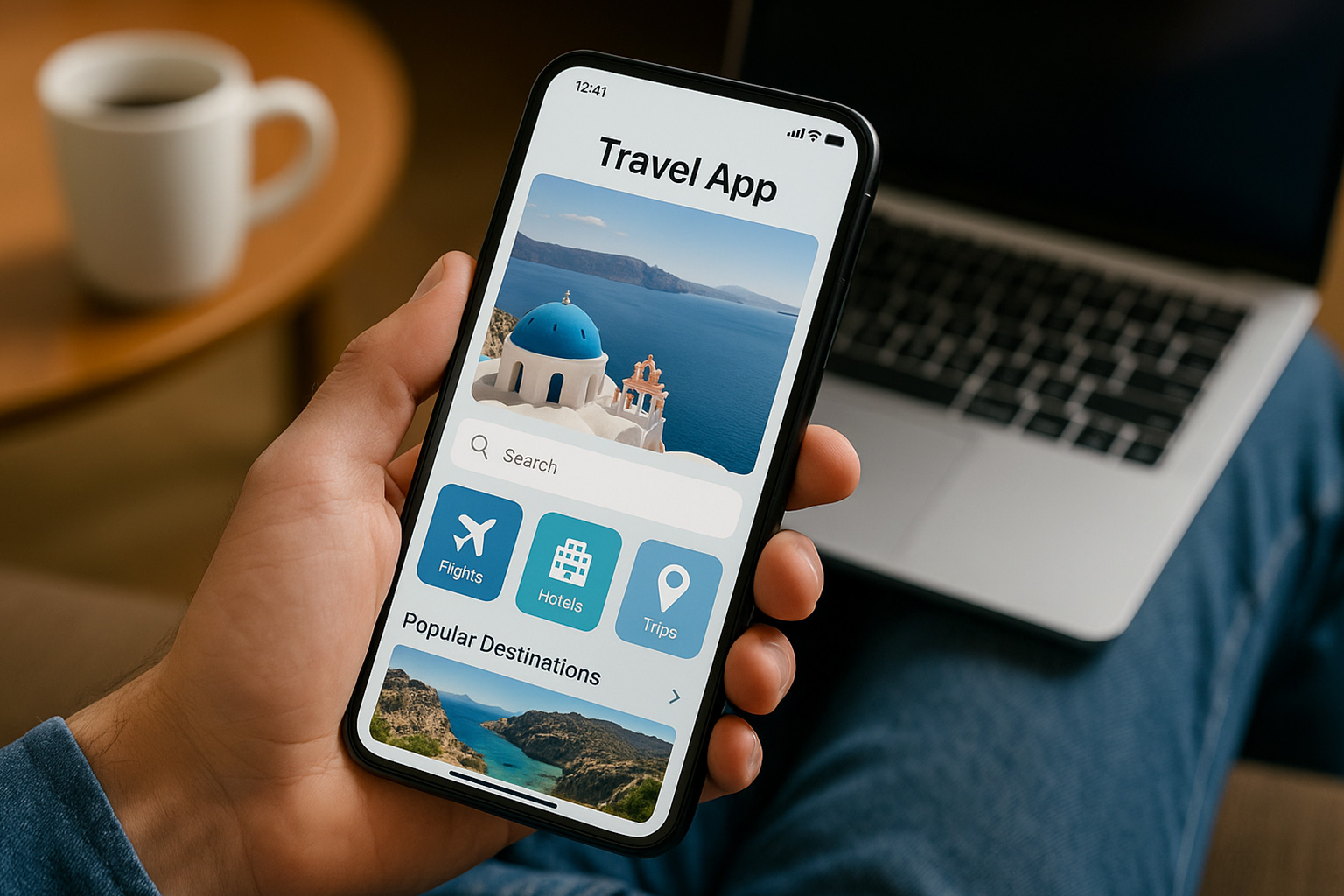Top Travel App Development Company in 2025: Features, Cost & Tech Stack Explained

15 Oct 2025
There is a significant digital transformation in the travel industry. As more and more travelers become dependent on the ability to organize, book, and manage travel via their smartphones, a powerful and user-friendly travel app is becoming a business imperative and not a luxury.
Whether it is custom-made itineraries and live flight cancellations or artificial intelligence-based suggestions and safe bookings, travel applications are transforming the way individuals travel. When you are a travel agency, tour operator, or a startup planning to expand in 2025, one of the best investments that you can make is creating a travel app that has features.
This is the guide to everything you need to know about it, such as the best features, the price structure, the technology stack, and how to select the greatest travel app development company to make your vision come true.
Why Travel Apps Are Booming in 2025
The world travel environment is changing at a fast rate, and the expectations of the users are changing as well. The travel and tourism app market has been forecasted to reach more than 1.2 billion dollars by 2025, with the growth of the desire to be personal, seek real-time information, and have smooth mobile experiences.
This is why the number of businesses switching to travel apps is on the rise:
- Mobile-first travel planning: More than three-quarters of travelers have begun to plan and book their trips on their smartphones.
- AI-based suggestions: Individualized implications of flights, hotels, and activities boost the number of bookings and enhance user satisfaction.
- Real-time information: Travelers can keep informed and entertained with real-time flight notifications, weather updates, and itinerary changes.
- New sources of income: Travel applications provide options for cross-selling, such as car hire, insurance, and local experiences.
You might be a travel agency, hospitality brand, or tour marketplace, but with a properly built mobile application, it will be easier to stay at the top of the competition and provide people with a better customer experience.
Key Features Every Successful Travel App Should Have
In order to be unique in the competitive marketplace, your travel application must not be a booking engine only; it must be a personalised travel assistant. The following are the requirements:
Core Features:
- Search & Discovery: allows users to search through flights, hotels, tours, and activities without difficulty.
- Booking and Reservations: Smooth flow of booking and real-time availability, as well as instant confirmations.
- What to See: AI-powered recommendations: Customized suggestions on preferences, search history, and seasonality.
- Real-Time Maps & Navigation: Built-In GPS to point out directions, places of interest, and the directions.
- Accepts Multiple Payments: Accepts credit cards, PayPal, Apple Pay, Google Pay, and even cryptocurrency.
- User Profiles and Loyalty Programs: enable users to keep a record of their bookings, rewards, and travel preferences.
- Push Notifications: Notify the customers about the delays in flights, booking notices, and offers.
- Language Support Multilingual and Multi-Currency: This is crucial to any global user and international traveling company.
All of these make a basic application a robust traveling ecosystem, making it more engaging, retaining, and converting.
Choosing the Best Technology Stack for Travel App Development
The success of your app is defined by the technology that it uses to be popular, scale, and succeed in the long term. The following is a modern travel application technology stack:
Frontend (Mobile):
- Cross-platform development with high performance, React Native or Flutter.
- SwiftUI (iOS) / Kotlin (Android) native development for optimal speed and UX
Backend:
- Node.js Backend Nova, high-performance, and scalable real-time data processing.
- Django / Laravel reliable folder structures with inbuilt protection and APIs.
Database:
- PostgreSQL / MongoDB dependable and scalable data storage.
APIs & Integrations:
- Booking.com, Skyscanner, and Amadeus flight and hotel data.
- Google Maps / Places API navigation and geolocation.
- Paid with Stripe/ PayPal payment.
Cloud & Infrastructure:
- AWS / Google Cloud scalable cloud hosting with built-in security and global CDN
A strong tech stack will make your travel application fast, secure, and future-proof - it can serve millions of users and in real-time travel data without any problems.
How Much Does It Cost to Build a Travel App in 2025?
The overall cost of developing a travel app also depends on various important characteristics, such as feature complexity, desired platforms, desired customization of the design, and third-party features, such as maps, payment providers, and AI assistants.
The rough idea of what affects your project budget is as follows:
- Features and Scope: Basic apps with simple booking and search capabilities will need less capital to develop, whereas more sophisticated features such as AI recommendations, loyalty programs, or real-time itinerary updates will require the time to develop.
- Design Complexity: The smoother, easier-to-use, and very interactive user interface will take more design time but give a better user experience.
- Platform Choice: iOS and Android native building is more expensive than launching on one platform or a cross-platform solution.
- Integrations & Security: Cost is also affected by adding payment gateways, third-party APIs, or higher-level data encryption.
- Expertise and Location of Team: More expert development company is a specialist in creating a travel app; therefore, it is more guaranteed to have better quality and faster delivery, and can be scaled in the long term.
Pro Tip: Most successful travel brands have an MVP (Minimum Viable Product) as their initial version of the app that has a minimum of necessary features. This is one of the approaches that will enable you to prove the idea, find early users, and add features and polish them before going to scale.
Why Businesses Are Investing in Custom Travel Apps
Investing in a custom travel app is not a choice anymore, but a competitive edge. This is the reason why firms are moving:
- Higher Investment: Customer satisfaction and higher repeat bookings are the results of personalized activities.
- Direct Customer Relationships: Decrease the dependence on third-party platforms and keep a higher amount of money.
- New Revenue Sources: Affiliate, premium subscriptions, and advertising.
- Actionable Insights: Use analytics to understand user behavior and optimize marketing campaigns.
A properly developed app can be a 24/7 online storefront, transforming travelers into dedicated customers and opening up new sources of revenue.
Why Choose NanoByte Technologies for Travel App Development
We are not merely a team of developers working at NanoByte Technologies, but strategic partners that assist travel businesses in standing upscale and innovating.
Here’s what sets us apart:
- End-to-End Expertise: Design, development, deployment, maintenance.
- AI-Powered Solutions: We combine machine learning to provide personalized suggestions and forecasts in travel.
- Scalable Architecture: Our applications are cloud-compatible and can support large traffic and international growth.
- Proven Results: our clients have increased bookings by up to 210% and user retention by 3 times in months.
Case Study: A startup based in California has hired NanoByte Technologies to develop a booking application. In the 6 months, their monthly active users had increased by 180, and their revenue had gone up by 220.
Conclusion: Transform Your Travel Business in 2025
A travel app is not merely an expedience in a fast-changing digital environment, but a competitive edge. Travel apps have the potential to transform the customer travel experience of discovery, planning, and enjoying the experience, through seamless booking, real-time updates, and AI-powered personalization.
You can make your vision a reality with a reliable travel application development firm such as NanoByte Technologies, regardless of whether you are a travel startup, a tour operator, or a global organization, because of advanced technology, creative features, and an interface that ensures visitors revisit.
Want to create the future of traveling?
Get in touch with NanoByte Technologies today and get a free consultation and start building a world-class travel app that will grow with your business.
FAQs About Travel App Development (2025 Edition)
Q1: How long does it take to build a travel app?
Generally, it would require 4-8 months, based on the complexity, to develop an idea to market.
Q2: Which is better: native or cross-platform development?
Cross-platform is quicker and less expensive, whereas native applications have slightly higher performance and UX.
Q3: How do AI and machine learning improve travel apps?
AI enables personalized recommendations, predictive pricing, smart itineraries, and better user engagement.
Q4: Can I integrate third-party APIs into my app?
Absolutely, APIs such as Amadeus, Booking.com, and Google Maps make apps functional and enjoyable to use.
Q5: Do you provide post-launch support?
Yes, our support is continuous, frequent, and updated, and features are added to ensure that your app is ahead of the competition.



.jpeg)

